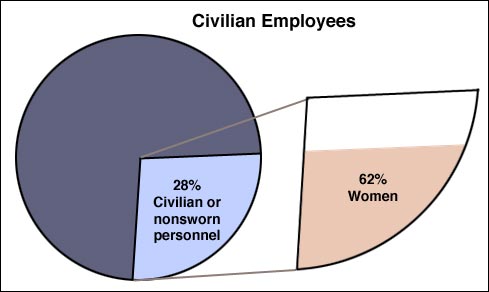Main Content
Lesson 2: TIntrodcution to Police Organization
Civilian Employees
The Uniform Crime Reports state that civilian or nonsworn police personnel make up about 28% of the workforce for police departments in the United States and 62% are women. Most police administrators, more concerned about public image than the reality of the policing occupation, have been replacing uniformed police officers with civilians in the hope of budget savings and appearing progressive. The increasing use of civilian specialists positions, with fairly high salaries, resulted in few savings in the budget.
The findings of Heininger and Urbanek (1983: 205) suggest that using civilians may not lead to cheaper police protection, that using civilians probably do not "displace" sworn officers, and that there is no apparent relationship between civilians and either quality of police protection or the risk of danger which must be assumed by sworn officers. These conclusions are more interesting in the light of secondary findings, which show that
- "real" police salaries are down;
- police departments command a diminishing portion of the municipal budget "pie" while . . .
- both municipal expenditures and personnel levels rose sharply.
Civilian personnel are now being used in sensitive position in records, dispatching, computers, and increasingly in making judgment call that will affect the department and sworn personnel. But this “window dressing” has come with a price. It fails to recognize that police officers get “used up” in the field. The long and erratic hours, and constant exposure to low levels of stress over prolonged periods have a direct effect on the mental and physical health of police officers. It also fails to take into account those officers who become chronically ill or injured on the job to such an extent that they cannot return to street duty. Under the current rubric, these officers would either be forced out of the department or given a disability pension. Either way, this is extremely shortsighted because many of these officers do not want to sever contact with policing. What is more, these officers possess a wealth of experience that would be tossed in the waste bin. These officers are prime material for dispatchers, complaint operators, crime scene technicians, records work, and many other positions. Indeed, it would make good sense to continue to use the experience and dedication of these officers who have made the sacrifice of their physical and mental health for our safety.

